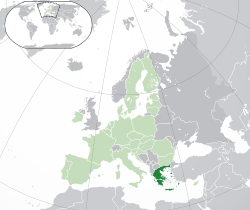
Greece
Country in Southeast Europe / From Wikipedia, the free encyclopedia
Dear Wikiwand AI, let's keep it short by simply answering these key questions:
Can you list the top facts and stats about Greece?
Summarize this article for a 10 years old
Greece,[lower-alpha 1] officially the Hellenic Republic,[lower-alpha 2] is a country in Southeast Europe, situated on the southern tip of the Balkan peninsula. Greece shares land borders with Albania to the northwest, North Macedonia and Bulgaria to the north, and Turkey to the east. The Aegean Sea lies to the east of the mainland, the Ionian Sea to the west, and the Sea of Crete and the Mediterranean Sea to the south. Greece has the longest coastline on the Mediterranean Basin, featuring thousands of islands. The country consists of nine traditional geographic regions, and has a population of approximately 10.5 million. Athens is the nation's capital and largest city, followed by Thessaloniki and Patras.
Hellenic Republic | |
|---|---|
| Motto: Ελευθερία ή Θάνατος Elefthería í Thánatos (English: "Freedom or Death") | |
| Anthem: Ύμνος εις την Ελευθερίαν Ímnos is tin Eleftherían (English: "Hymn to Liberty") | |
Location of Greece (dark green) – in Europe (light green & dark grey) | |
| Capital and largest city | Athens 37°58′N 23°43′E |
| Official language and national language | Greek |
| Religion (2017) |
|
| Demonym(s) |
|
| Government | Unitary parliamentary republic |
| Katerina Sakellaropoulou | |
| Kyriakos Mitsotakis | |
| Konstantinos Tasoulas | |
| Legislature | Hellenic Parliament |
| Establishment history | |
| 25 March 1821 (traditional starting date of the Greek War of Independence), 15 January 1822 (official declaration) | |
| 3 February 1830 | |
| 24 July 1974 | |
| 11 June 1975 | |
| Area | |
• Total | 131,957 km2 (50,949 sq mi)[2] (95th) |
• Water (%) | 1.51 (2015)[3] |
| Population | |
• 2021 census | |
• Density | 79.1[5]/km2 (204.9/sq mi) (133th) |
| GDP (PPP) | 2023 estimate |
• Total | |
• Per capita | |
| GDP (nominal) | 2023 estimate |
• Total | |
• Per capita | |
| Gini (2022) | medium |
| HDI (2021) | very high · 33rd |
| Currency | Euro (€) (EUR) |
| Time zone | UTC+02:00 (EET) |
| UTC+03:00 (EEST) | |
| Date format | dd.mm.yyyy (AD)b |
| Driving side | right |
| Calling code | +30 |
| ISO 3166 code | GR |
| Internet TLD | |
| |
Greece is considered the cradle of Western civilization, being the birthplace of democracy, Western philosophy, Western literature, historiography, political science, major scientific and mathematical principles, theatre and the Olympic Games. From the eighth century BC, the Greeks were organised into various independent city-states, known as poleis (singular polis), which spanned the Mediterranean and the Black Sea. Philip II of Macedon united most of present-day Greece in the fourth century BC, with his son Alexander the Great rapidly conquering much of the known ancient world, from the eastern Mediterranean to northwestern India. The subsequent Hellenistic period saw the height of Greek culture and influence in antiquity. Greece was annexed by Rome in the second century BC, becoming an integral part of the Roman Empire and its continuation, the Byzantine Empire, which was culturally and linguistically predominantly Greek. The Greek Orthodox Church, which emerged in the first century AD, helped shape modern Greek identity and transmitted Greek traditions to the wider Orthodox world. After falling under Ottoman rule in the mid-15th century, Greece emerged as a modern nation state in 1830 following a war of independence.
Over the first hundred years the kingdom of Greece sought its territorial expansion, which was mainly achieved in the early 20th century, during the Balkan Wars and up until its Asia Minor Campaign ended with a catastrophic defeat in 1922. The short-lived republic that followed, beset by the ramifications of civil strife and the challenge of resettling the refugees from Turkey, came to an end in 1936, when the imposition of a royalist dictatorship inaugurated a long period of authoritarian rule, marked by military occupation during World War II, civil war and military dictatorship. Greece achieved record economic growth from 1950 through the 1970s, allowing it to join the ranks of developed nations. Democracy was restored in 1974–75, and Greece has been a parliamentary republic ever since. The country's rich historical legacy is reflected in part by its 18 UNESCO World Heritage Sites.
Greece is a unitary parliamentary republic, and a developed country, with an advanced high-income economy. Its economy is the second largest in the Balkans, where it is an important regional investor. A founding member of the United Nations, Greece was the tenth member to join the European Communities (precursor to the European Union) and has been part of the Eurozone since 2001. It is also a member of numerous other international institutions, including the Council of Europe, NATO, the OECD, the WTO, and the OSCE. Greece has a unique cultural heritage, large tourism industry, and prominent shipping sector.


.svg/250px-EU-Greece_(orthographic_projection).svg.png)
